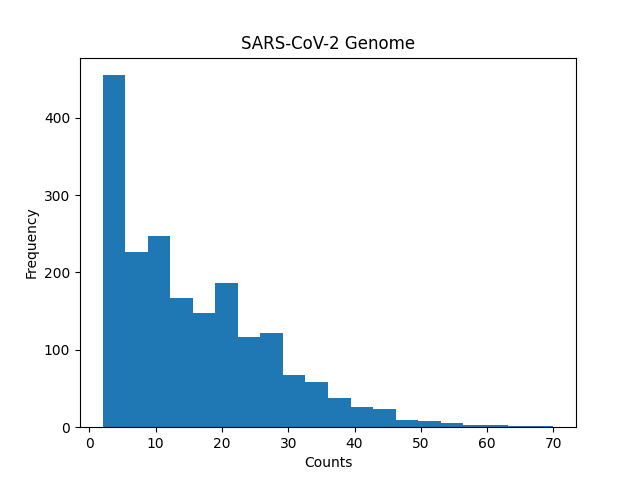A specialized datastructure and tokenization library for counting genetic sequences for use in Machine Learning and Bioinformatics. DNA Hash stores k-mer sequence counts by their up2bit encoding - an efficient two-way hash that works with variable-length sequences. As such, DNA Hash uses considerably less memory than a lookup table that stores sequences in plaintext. In addition, DNA Hash's novel autoscaling Bloom filter eliminates the need to explicitly store singletons and makes it suitable for use on streaming data.
- Ultra-low memory footprint
- Variable sequence lengths
- Embarrassingly parallelizable
- Open-source and free to use commercially
Note: Due to the probabilistic nature of the Bloom filter, DNA Hash may over count sequences at a bounded rate.
Install DNA Hash using a Python package manager, example pip:
pip install dnahash
from dna_hash import DNAHash
from dna_hash.tokenizers import Kmer, Canonical
from Bio import SeqIO
from matplotlib import pyplot as plt
hash_table = DNAHash(max_false_positive_rate=0.001)
tokenizer = Canonical(Kmer(6))
with open('covid-19-virus.fasta', 'r') as file:
for record in SeqIO.parse(file, 'fasta'):
for token in tokenizer.tokenize(str(record.seq)):
hash_table.increment(token)
for sequence, count in hash_table.top(25):
print(f'{sequence}: {count}')
print(f'Total sequences: {hash_table.num_sequences}')
print(f'# of unique sequences: {hash_table.num_unique_sequences}')
print(f'# of singletons: {hash_table.num_singletons}')
plt.hist(list(hash_table.counts.values()), bins=20)
plt.title('SARS-CoV-2 Genome')
plt.xlabel('Counts')
plt.ylabel('Frequency')
plt.show()TAACAA: 70
TTAAAA: 68
ACAACA: 65
...
CATTAA: 49
Total sequences: 29876
# of unique sequences: 2013
# of singletons: 100
- [1] https://github.com/JohnLonginotto/ACGTrie/blob/master/docs/UP2BIT.md.
- [2] P. Melsted et al. (2011). Efficient counting of k-mers in DNA sequences using a bloom filter.
- [3] S. Deorowicz et al. (2015). KMC 2: fast and resource-frugal k-mer counting.
- [4] A. DalPino. (2021). OkBloomer, a novel autoscaling Bloom Filter [link].
